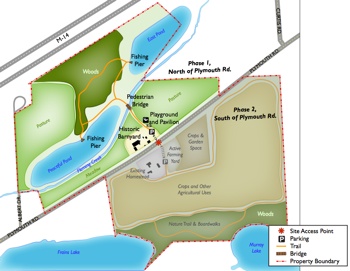Deer in front yard.
Stories indexed with the term ‘deer’
Ann Arbor Acts on Deer Problem
The Ann Arbor city council has directed city administrator Steve Powers to partner with other organizations to develop strategies for deer management. Powers is supposed to report back to the city council by July 31, 2014 on the status of the partnership, including budget and timelines. The resolution, put forward by Jane Lumm (Ward 2), states that the desired outcome is a community-endorsed deer management plan.
The Ann Arbor city council took the action at its May 5, 2014 meeting.
Other organizations named in the resolution as potential partners include the Washtenaw County Parks and Recreation Commission, the University of Michigan, the Humane Society of Huron Valley, and the Michigan Department of Natural Resources Wildlife Division. A recent meeting of the Washtenaw … [Full Story]
County Parks Commission Gives Trail Grants
Washtenaw County parks & recreation commission meeting (March 11, 2014): Commissioners approved an application for state funds to develop a major new recreation area just northeast of Ann Arbor. They also awarded $600,000 in grants for trail projects throughout the county.
Commissioners approved an application to the Michigan Dept. of Natural Resources trust fund for a grant to help develop Staebler Farm for recreational use. WCPARC has owned the 98-acre property in Superior Township since 2001, and Donald Staebler – who is 103 years old – still lives there in a lifetime agreement with WCPARC. The plan calls for adding fishing piers to the property’s two ponds, as well as putting in a trail system and other features. A second phase might involve developing a farm incubator program.
Commissioners also awarded $600,000 in grants through WCPARC’s Connecting Communities program, which supports trail projects throughout the county. Grants were given to projects in Ann Arbor Township, Northfield Township, Pittsfield Township, and the village of Manchester.
In non-voting business, WCPARC director Bob Tetens gave an update on the east county recreation center, a proposed partnership between the city of Ypsilanti and WCPARC in which the city would supply the property and WCPARC would provide the building. The center would be located on part of the 38-acre Water Street redevelopment area. Tetens said they’ve been working with the city of Ypsilanti on a development agreement.
Ypsilanti mayor Paul Schreiber and city councilmember Pete Murdock both spoke to the commission about Water Street during public commentary. Schreiber told commissioners that he wasn’t aware of any “show-stopping” issues. He also gave an update on Water Street Flats, an apartment project that’s planned for the site. The complex would be rental apartments for residents with between 50-90% of area median income.
In other action, commissioners approved about $500,000 for repairs at the Rolling Hills water park, and were briefed on several financial reports and project updates.
An issue that had been raised during public commentary at the Feb. 11, 2014 meeting emerged again on March 11: How should deer overpopulation be managed? Two residents – Maurita Holland and Barb Lucas – urged commissioners to play a role in dealing with the issue, which is affecting WCPARC parks and preserves. “We know there’s a lot of political fallout and a lot of education that needs to be done,” Holland said. She reported that a new group has formed – Washtenaw County for Ecological Balance. Members of WCEB include Larry Kestenbaum, Washtenaw County’s clerk/register of deeds, and Chris Graham, who serves on Ann Arbor’s environmental commission.
Commissioners discussed the issue at length. Jan Anschuetz advocated for a cautious approach, noting that it’s a complex problem that needs to be addressed by multiple entities, not just WCPARC. She also expressed concern that action by WCPARC could affect the 10-year renewal of the operations millage that WCPARC expects to be put on the November 2014 ballot. “If we do something that displeases our public, we will not have a millage and will not have a parks commission and we will not have a preserve,” she said.
Janis Bobrin noted that in this community, “If we start talking about killing anything, there are people who will just not hear anything after that.” There’s the actual management of the problem, she said, but also a major education piece that’s needed. “How do we begin to get a dialogue that isn’t one camp against another? That would seem to be a productive first step.”
Tetens told commissioners that WCPARC has applied for a $29,960 grant through the Michigan Dept. of Natural Resources wildlife habitat grant program. Those funds would allow WCPARC to quantify the deer impact on county parks and preserves more precisely. Everyone agrees that the growing deer population is a problem, Tetens said, but “nobody can solve it on their own.”
Commissioners also authorized Tetens to draft a letter opposing a proposed sand and gravel mine that McCoig Materials wants to start in Lyndon Township, on 189 acres north of Chelsea on M-52. The rural site is located near several parks and nature areas, including Waterloo State Recreation Area, the Pinckney State Recreation Area, Park Lyndon, the Green Lake Camping area, and the Waterloo-Pinckney Hiking Trail. WCPARC has been interested in buying the property for at least two decades, and is hoping to work with the current landowner to add the site to the county’s nature preserves, rather than being mined.
The March 11 meeting began with a moment of silence for Fred Veigel, a long-time parks & recreation commissioner who represented the road commission on WCPARC. He died on March 2. Commissioners also passed a resolution of appreciation for his work. A replacement to WCPARC will be appointed from one of the current three road commissioners: Barb Fuller, Doug Fuller or Bill McFarlane. [Full Story]
Jackson Road & Parkland Plaza
Two deer dash across Parkland Plaza Drive from east to west. They are followed by a third, youngish looking deer who totally did not look both ways before crossing.
In It For The Money: Whole Hog
Editor’s note: Nelson’s “In it for the Money” opinion column appears regularly in The Chronicle, roughly around the third Wednesday of the month.
You might choose to disintermediate your meat consumption for a variety of reasons.
Maybe you’re a local organic kinda gal. Maybe you want a niche product (e.g., heritage pork, halal goat, bilingual llama) but can’t swing the upmarket prices at Whole Foods and their ilk. Maybe you want to keep the government out of your meat purchasing decisions.
Maybe you thrill to the challenge of using the whole hog, one piece at a time. Maybe you want to eat meat as ethically as possible, personally verifying that the animals are treated kindly in life and compassionately in death. [1]
Whatever your motivation, as Michiganders, you are perfectly situated to enjoy the most deliciously ethical domestically raised meat available in this modern world.
Who do you have to thank for this boon? Lazy deer-hunters, fickle farmers, conspiracy theorists, gun “nuts” – the usual folks. [Full Story]
Washtenaw County’s Taxable Value Falls
Washtenaw County board of commissioners meeting (April 20, 2011): The county’s finances were the focus of Wednesday’s meeting, which included a presentation of the annual equalization report. That report is the basis for determining taxable value of property in the county, which in turn indicates how much tax revenue is collected by local taxing entities. In the world of municipal finance, the equalization report is a very big deal.

Raman Patel, director of Washtenaw County's equalization department, presented his annual report at the April 20, 2011 board of commissioners meeting. (Photos by the writer.)
Raman Patel, director of the county’s equalization department, told commissioners there was a 2.85% drop in taxable value this year. That’s an improvement over last year’s decline, when taxable value of property in the county fell 5.33%. It’s also a smaller decrease than was projected when preparing the county’s 2011 budget, which was built on the assumption of an 8.5% drop.
The impact on local taxing entities varies. The city of Ann Arbor saw a 1.21% drop, for example, while taxable value in Ypsilanti Township fell 11.39%.
The report also highlighted a shift in the county’s largest taxpayers. Just a few years ago, the top three taxpayers were Pfizer, General Motors and Ford. Now, they are Detroit Edison, McKinley Associates and Toyota.
The meeting also included a presentation of the 2010 comprehensive annual financial report, or CAFR. Kelly Belknap, the county’s finance director, highlighted the fact that the county ended 2010 with a $5.5 million general fund surplus – slightly more than the $5.3 million calculated to carry over into the 2011 budget. Mark Kettner from the accounting firm Rehmann Robson, which conducts the county’s audit, was also on hand to give a brief report on the 2010 audit.
In other business, the board approved an amendment to the brownfield plan for BST Investments in Dexter, and set two public hearings for their May 18 meeting related to brownfield plans that are being proposed: (1) Packard Square, a complex off of Packard Street on the site of the former Georgetown Mall; and (2) the LaFontaine Chevrolet redevelopment at 7120 Dexter-Ann Arbor Road in Dexter.
The board also authorized the office of the water resources commissioner to take court action in setting winter lake levels at Portage and Baseline lakes. The office operates the dam at Portage Lake that controls those levels.
During their time for communications, commissioners raised several issues, including: (1) a call to support the special education millage renewal, which is on the May 3 ballot; (2) discussions about consolidating the office of community development, ETCS (the employment training and community services department) and the economic development & energy department; and (3) what to do about the growing deer population.
Wednesday’s meeting began with a tribute to the long-time director of the Washtenaw Community Concert Band, Jerry Robbins. [Full Story]
Fraser Acted Against Advice on Proposal
Ann Arbor City Council Sunday caucus (Jan. 17, 2010): Conversation among councilmembers and residents on Sunday night yielded some additional historical insight into development plans for the Library Lot above the underground parking garage, which is currently beginning construction.
Stephen Rapundalo (Ward 2) revealed that when city administrator Roger Fraser mentioned an unsolicited development proposal at the city council budget retreat in January 2009, he had acted against the advice of members of the council’s budget and labor committee. The committee had become aware of the proposal’s existence prior to the retreat, Rapundalo reported, and when they did, “We said that should be put away on a shelf somewhere. … (but) Roger chose to mention it at the retreat.” Rapundalo also added that while some councilmembers had seen the unsolicited proposal, he had not.
Sabra Briere (Ward 1) recalled a phase in the community conversation about the future of the city-owned Library Lot that predated the January 2009 budget retreat. It was a time when the discussion centered on leaving the top of the parking structure as a temporary surface parking lot while its eventual, more permanent fate was considered – still a possibility, based on Sunday’s caucus discussion.
Besides the Library Lot, residents who attended caucus touched on other issues – the city council’s role in city governance, and the capital improvements plan for the year, which is on the council’s Tuesday night meeting agenda. Council is meeting on Tuesday, rather than its usual Monday schedule, because of the Martin Luther King Jr. holiday. [Full Story]
Meeting Watch: Council Caucus (30 Nov. 2008)
Six councilmembers braved the frozen slurry coating the streets and still falling from the sky on Sunday to hear a preview of two planning-related agenda items from interested parties: City Apartments site plan, and City Place PUD rezoning petition. They also heard commentary from the public on a third agenda item: the $411,003 amendment to the contract with the architect for the new police-courts facility. In addition, they received a request for recognition of an upcoming vigil for human rights. Among themselves, councilmembers also discussed the protocol for proclamations, and the need to give due attention to the funding of an animal control officer as budget discussions begin in the new year. [Full Story]





